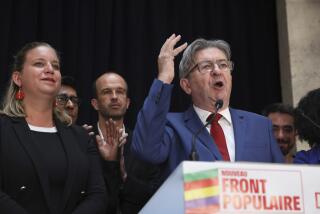Algerian election sees low turnout
- Share via
ALGIERS — Widespread cynicism and fears of violence kept many Algerians on Thursday away from balloting to elect a new parliament.
“This year’s election, like the ones before, is an electoral masquerade. The outcome was decided beforehand,” said Amine Sidhoum, a human rights lawyer in Algiers. “We know that the president’s party will win whether the people participate or not.”
For the record:
12:00 a.m. June 3, 2007 For The Record
Los Angeles Times Sunday June 03, 2007 Home Edition Main News Part A Page 2 National Desk 0 inches; 33 words Type of Material: Correction
Algeria election: An article in the May 18 Section A about the Algerian parliamentary election said the city of Constantine is in the western part of the country. It is in the east.
Heavy security Thursday seemed to have prevented widespread violence, although a bombing the day before killed one man and injured five others in the western city of Constantine. Interior Minister Noureddine Yazid Zerhouni said the attack was an “act of sabotage” intended to disrupt the vote.
Thousands of security personnel fanned out across the country, closing markets and setting up checkpoints. Government troops also killed more than a dozen dissidents in coordinated strikes this week, local news reports said.
Last month, two bombings near the prime minister’s office killed at least 33 people and wounded 220, the deadliest attack so far by a resurgent militant group affiliated with Al Qaeda. The group had warned voters to stay away from the polls.
“If you participate in these elections today, then you are with the traitors in this great sin and you will support them in their tyranny and infidelity and their fight against religion,” said Abu Musab Abdul Wadud, the group’s leader, or emir, in a statement broadcast on the Internet.
Polling stations in most neighborhoods, poor or affluent, were largely empty. By noon, an official at one center in Algiers said that less than 10% of eligible voters had participated.
Officials said the 30% turnout was an all-time low in elections for the 389-seat lower house of parliament, whose members serve for five years.
“Why should I vote,” said Mohammed Rouane, 18, unemployed and living with 10 siblings in a decrepit house in the Old City. “I don’t expect anything from the Algerian government. [They] have done nothing for us.”
His friend Riadh Sahouli, 19, didn’t vote either. “The politicians are always lying to us,” he said. “They promise a lot but nothing happens. There is no work, and no money.”
Rachid Saidi, a 35-year-old teacher, was among the rare voters. “I hope that once elected, they will not forget us,” he said.
Two dozen parties are competing, with most candidates coming from the Presidential Alliance, which holds 270 seats in the outgoing assembly.
The last general election, in 2002, was also marked by violence, boycotts and voter fatigue.
For years, the government has suppressed political dissidents, restricted civil rights and jailed protesters.
Fifteen years ago, the government declared a state of emergency, canceling the result of an election won overwhelmingly by the Islamic Salvation Front. A subsequent insurgency and brutal crackdown claimed at least 150,000 lives. The government has begun a reconciliation process, giving concessions to both Islamists and the disenfranchised Berbers of the Kabylie region in recent years.
The independent Al Watan, or the Nation, newspaper said this year’s election campaigns were as meaningful as playing Japanese drums for the deaf. The paper pointed out that candidates had to cancel political rallies for lack of audiences. Not that Algerians are apolitical, the paper noted: They were captivated by French elections.
“The moment of truth has come: There are no elections in Algeria,” said another independent newspaper, El Khabar, or the News, in an editorial.
Results are expected this week.
Observers noted that any split in the ruling alliance could indicate a brewing battle to succeed President Abdelaziz Bouteflika, 70. By law he can’t seek reelection when his second term ends in 2009.
Any political change during Bouteflika’s terms has been cosmetic, said Sidhoum, the human rights attorney.
“There’s no real opposition party today in Algeria,” he said. “People feel totally disgusted by the political reality here.”
*
Special correspondent Chitour reported from Algiers and Times staff writer Roug from Beirut. Special correspondent Arezki ait-Larbi in Algiers contributed to this report.
More to Read
Sign up for Essential California
The most important California stories and recommendations in your inbox every morning.
You may occasionally receive promotional content from the Los Angeles Times.













